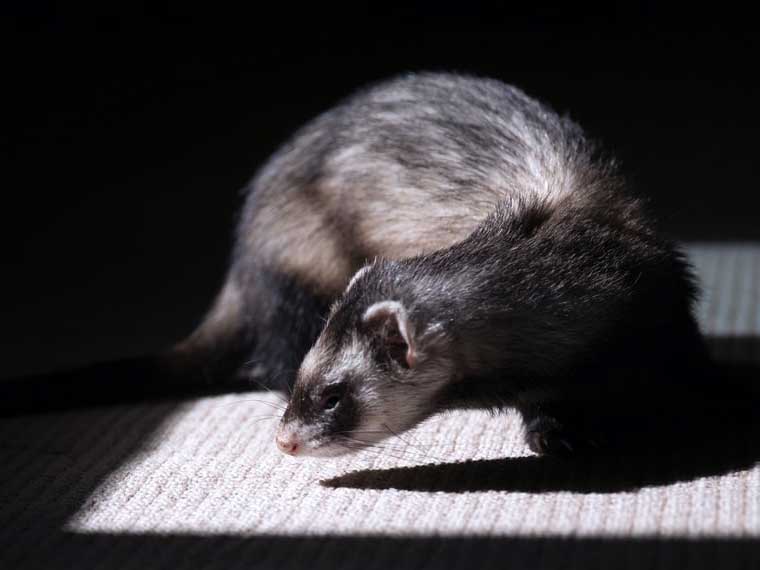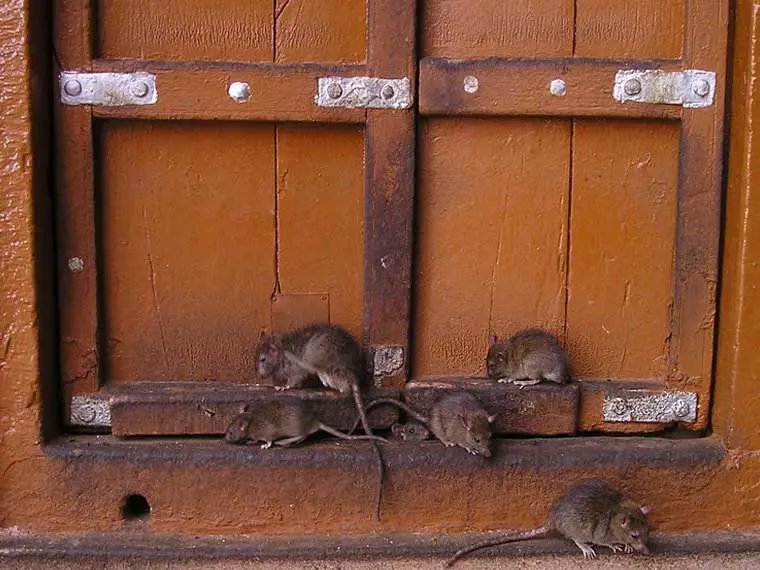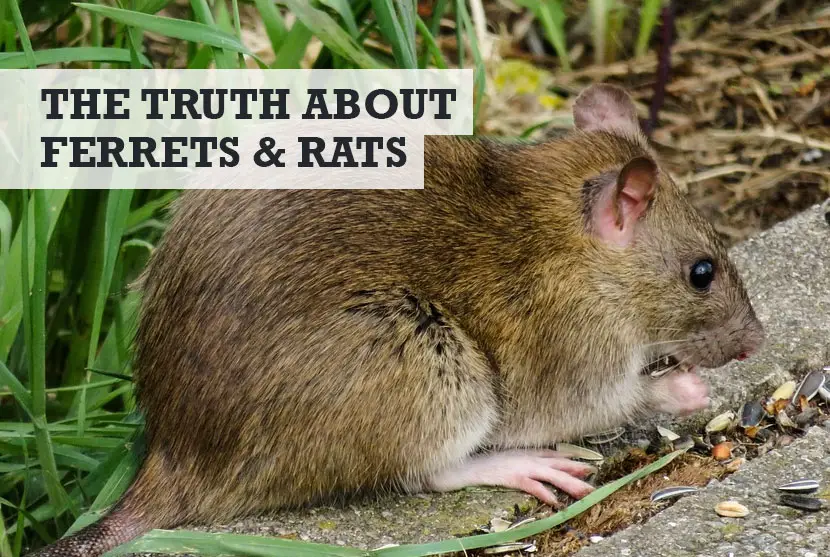If you’re considering owning a ferret, then you might have a couple of questions about their relationship with rats. For example, will having ferrets on your property attract rats? Or how about using ferrets to catch and kill rats on your land. Here’s all you need to know, with a short answer first.
Do ferrets attract rats? Ferrets do not attract rats. In fact, research in 2008 found that ferret odor can actually produce a stress response in rats and other rodents such as mice. As a result, the smell of ferrets or keeping ferrets will not attract rats to your property.
It’s conclusive that ferrets do not attract rodents, rats, and mice. But will ferrets keep rats away? No, ferrets won’t keep rats away completely and you still might get a brave rat who isn’t scared to be on your land.
However, when it comes to catching and killing rats, your ferret could act upon its instinct.

Do ferrets kill rats?
Ferrets can kill rats, as they have predatory hunting instincts and will smell or sense them. It’s interesting, because ferrets are often mistaken for rodents due to their appearance and possibly as most people see them in pet shops next to rats, mice, hamsters and guinea pigs.
Ferrets have been known to smell rats then go into holes and burrows to catch and kill the rats.
Although, there are specialists who raise ferrets to control rodent pests, it is not advisable to put your pampered pet to work as a rat catcher. Ferrets are unpredictable, and you might end up with a lost pet.
Do ferrets and rats get along?
The truth is that ferrets and rodents do not get along, In fact, some might say thet they are mortal enemies.
Research into ferrets attracting rats
At the top of the article I explained how research found rats were scared of ferret smells. The research paper was published in 2008. Here’s a quote.
Predator odors have been shown to elicit stress responses in rats. Plasma corticosterone and adrenocorticotropin hormone levels were higher after 30 min of exposure to ferret odor (fur/skin) but not control odors, ferret feces, urine, or anal gland secretions. These results suggest that ferret odor produces a reliable unconditioned stress response and may be useful as a processive stress model.
The nature of ferrets
Ferrets are descendants of the weasel family, much like dogs are descendants of wolves. Much interbreeding has taken place amongst the musteline family to which it belongs. This tribe includes minks, polecats, sables and otters.
Ferrets are obligate carnivores which means that at least 70% of their diet has to be derived from protein, preferably in the form of raw meat. They are natural born hunters of small animals, which is why ferrets can kill rats.
They are also agile hunters that can catch predators as small as mice and as large as rabbits. If hungry, they will eats birds, squirrels and even chickens… and here’s more on their relationship with cats.
They are well adapted for this task. Their serpentine bodies are slender and flexible. They can flatten their bodies and follow their prey into the smallest of hideouts. They can also see well in the dark.
If you examine them closely, you will note that a ferret’s teeth are similar to those of a dog. They have incisors, for picking up food, canines for puncturing and tearing, premolars for shearing, and molars for grinding.
Their teeth can process an entire carcass, breaking it into bits for easy digestion.

The history of ferrets
Ferrets and their country cousins have had a long association with royalty. Whereas sable and ermine were raised for their furs, ferrets were domesticated for their ability to hunt vermin. Their history with humans dates back more than 2500 years.
Typically, a lady at court would keep a ferret in one of her voluminous sleeves. Ferrets are happy to sleep in long dark, warm places for up to 18 hours a day. When an unwelcome pest was spotted, the lady would alert the ferret who would then leave its den and race after the rat.
Invariably, it would be successful at killing the target. Wherever a rat can go, a ferret can go, and a hungry ferret will have no mercy. A ferret will smell a rat, then chase it down for the kill.
After feasting on the entire carcass, the ferret would return to its comfortable bed in the sleeve, and fall asleep. A number of ferrets would be needed for pest control because once a ferret has eaten its fill, it falls into a deep sleep, from which it seemingly cannot be raised.
Ferrets as pest control
The words ‘ferret’ and ‘ferreting’ have made their way into the English language. They mean to search, and hunt using ferrets, respectively. Ferreting is a long practised sport in England and is still legal to this day, usually with wild rabbits as the target.
Ferrets and dogs (read more) are excellent and efficient hunting partners, and have been known to kill hundreds of rats in a single day.
Out in the open, the pest controller will send the ferret down into a rat burrow. In the frenzy, the rats will scurry to the surface where the dogs will dispatch them.
Fortunately, the dogs can distinguish between the scent of the ferret and that of a rat and will only pounce on the rodents. Care needs to be taken to keep the ferret hungry, however. Once it has eaten its fill, it is rendered ineffective and will just want to sleep!
If a ferret is hunting alone, indoors, it is good practice to let the predator scout out the terrain during the day, using its sense of smell. Then it is set to hunting at night when the rats are most active and the ferret’s eyesight allows it more of an advantage.
In the wild, ferrets will kill local species of rodents. For example, the Black Footed Ferret feeds mostly off prairie dogs, which can make up 90% of their diet.
It takes 100 acres of prairie dog colonies to support a female ferret and her kits. The need for agricultural land has limited the habitats of both species and put the Black Footed Ferret on the endangered list.
Domesticated ferrets as pest control
Since the 1960s the popularity of ferrets has risen somewhat. They are kept indoors or in controlled environments outside. They have protective cages, hammocks in which to sleep, toys and specialised diets. Although they have a reputation for biting, few people view them as predators.
The truth is that it is probably more dangerous for the ferret to hunt a rat than at any time in history. It is advisable to keep your ferrets away from modern day rodent pests and call in professional pest controllers, or use alternative natural methods.
Poison
One of the chief dangers is the prevalence of pest control poisons. If you live in a built up area and have a rat or mouse infestation in the area, the chances are good that someone in the neighbourhood has set out poison to try to alleviate the problem.
The poison does not die with the intended animal, it remains in its system and could be ingested by your ferret if it catches and kills the rat before it dies of the poison. Ferrets, if hungry, will eat the entire carcass of their prey.
Fleas and other parasites
Rat fleas were responsible for the bubonic plague in London that killed 100 000 people in the 17th century. The disease is still killing people today. If your ferret goes into a rat hole, it may catch more than a rat. You do not want rat fleas near your home or pets.
Rats are also hosts to ticks which are carriers of tick fever and Lyme disease.
Disease
Besides carrying fleas, that carry the bubonic plague and other diseases, rats are also responsible for directly transmitting a number of diseases that are detrimental to ferrets, humans and other pets. So, yes, ferrets can get diseases from rats!
These include rat-bite-fever, hemorrhagic fevers that can affect both the lungs and kidneys, as well as salmonellosis which is caused by bacteria. These can be transmitted by being bitten by a rat, drinking or eating food contaminated with rat faeces, or breathing in air that has been contaminated.
These are all very good reasons to prevent a rat infestation.
Bites
In a fight with a rat, the ferret will invariably win but it could be hurt in the process. A bite or a scratch from a rat will cause infection which needs to be seen to immediately. Even professional pest controllers that use ferrets, rest those that have been injured in a rat fight for at least a month.
Unfit for duty
Most pet ferrets are fed well and have lost the will to hunt. Anecdotal evidence suggests that a satiated ferret will sleep soundly and ignore rodents, even if they are housed in the same cage.
How rodents feel about ferrets?
Rodents are terrified of ferrets and will try to keep their distance, even from the scent of a ferret. Research has shown that rodents show increased stress when confronted with the odour, fur, faeces and urine of a predator, including cats and ferrets. They are especially alarmed at the smell of the urine of meat-eating animals.
However, spraying ferret urine in strategic places, will not help to alleviate a rat problem in the long term. The research cited found that ferret urine is not a rat deterrent, but the smell of a ferret’s skin and fur is.
This is because rats are wily creatures and will soon learn that the urine does not translate into a death threat, and will set up house anyway if they don’t think ferrets are living close by.
Alternative pest control methods
Rats and other rodents do not like some of the strong odours that are more easily tolerated by humans. Examples of effective rat repellents are:
- essential oils, such as peppermint, eucalyptus and wintergreen
- cloves
- combinations of hot pepper, chilli, onion and garlic spray
- vinegar or ammonia soaked cotton balls
- coffee grinds
- citronella
Conclusion
Rodents are repelled by the smell of ferrets and their close relatives, weasels and polecats. It makes you wonder how the rodents feel being so close to their predators in a pet shop.
But the truth is, ferrets will kill rats, but they won’t attract them to your home.
You might also like…
- The most probable reasons your ferret is getting skinnier
- Interesting ways you can bond more with your ferret
- Why your ferret might catch, kill, and eat a snake
Rat image in header via https://pixabay.com/photos/wildlife-rodent-rat-brown-3552300/

